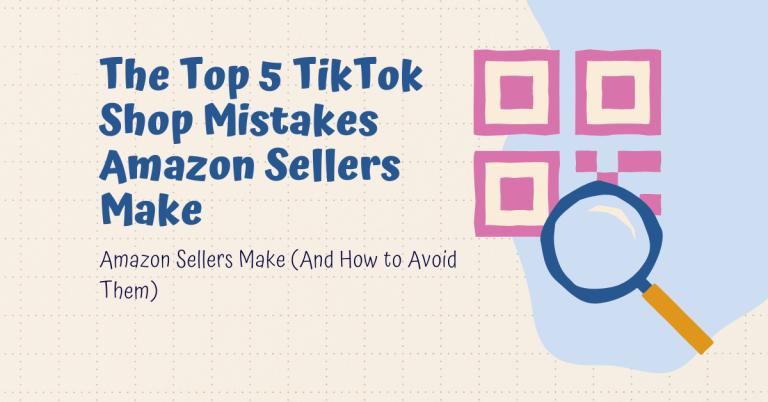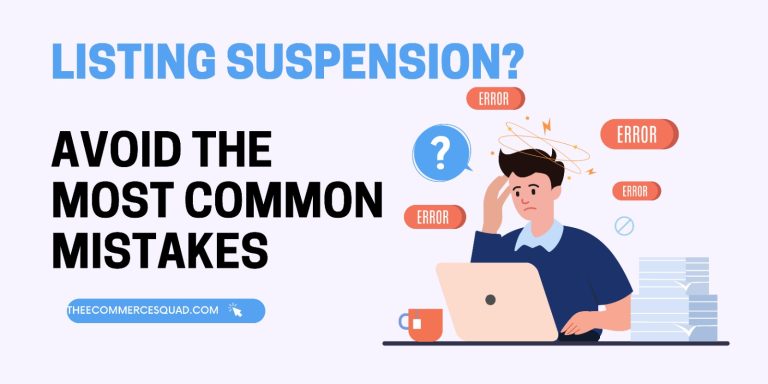The Top 5 Product Research Mistakes Amazon Sellers Make (And How to Avoid Them)
Product research is the cornerstone of any successful Amazon business. But even experienced sellers can fall into common traps that prevent them from finding profitable products. Avoiding these mistakes can save you time, money, and frustration while increasing your chances of success.
In this blog, we’ll cover the top 5 product research mistakes that Amazon sellers often make and, more importantly, how to avoid them to maximize your profits.

1. Ignoring Data-Driven Insights
Mistake: Many sellers rely solely on gut feelings or trends they see on social media to choose products, without looking at the underlying data. While a product may appear popular, its long-term viability often depends on factors like sales volume, competition, and market trends.
How to Avoid It:
Always use a data-driven approach when conducting product research. Tools like Jungle Scout provide essential data on product demand, competition, and profitability. You can use the Opportunity Finder to get insights into trending products, while the Product Database allows you to filter products based on key metrics like revenue and reviews.
By relying on concrete data rather than assumptions, you ensure that you’re entering a market with real potential rather than just following a fad.
2. Choosing Overly Competitive Products
Mistake: Selecting a product in a highly competitive niche is one of the most common errors new sellers make. Even if the product is in demand, trying to compete with established sellers can make it difficult to gain traction.
How to Avoid It:
Focus on finding low-competition niches with high demand. Use Jungle Scout’s Keyword Scout to identify product niches with decent search volume but less competition. Look for products where existing sellers have a lower number of reviews—this can indicate a less saturated market.
By choosing a product that has untapped potential, you increase your chances of standing out in the marketplace and securing sales without being overshadowed by bigger brands.
3. Overlooking Profit Margins
Mistake: Many sellers choose products without calculating all associated costs, such as shipping, storage, and Amazon fees. This leads to slim profit margins, making it hard to scale the business.
How to Avoid It:
Before investing in a product, calculate your profit margin carefully. Jungle Scout’s Profit Calculator can help you estimate expenses like FBA fees, shipping costs, and product price. Aim for products that have a minimum profit margin of 30% to ensure that you’re left with enough profit after covering all expenses.
Understanding the full financial picture ensures you’re not underpricing your product or ending up with unexpected costs that hurt profitability.
4. Failing to Validate Product Demand
Mistake: A product may look appealing on the surface, but if there’s not enough consistent demand, you could end up with dead stock that doesn’t move.
How to Avoid It:
Use Jungle Scout’s Product Tracker to monitor sales trends over time. Track your potential product for at least 2-4 weeks to ensure that demand is stable and not seasonal or fleeting. If the product shows consistent sales, it’s a good indication that it’s worth pursuing.
Tracking product demand over a longer period prevents you from jumping into trends that may be short-lived, saving you from excess inventory.
5. Focusing Too Broadly or Narrowly
Mistake: Some sellers target overly broad categories, competing with thousands of similar products, while others choose niches that are too specific and have little demand.
How to Avoid It:
Strike the right balance by choosing a sub-niche with good demand but moderate competition. Jungle Scout’s Opportunity Finder helps you find niches that aren’t overly saturated but still have enough sales volume to be profitable.
Targeting sub-niches allows you to cater to a more defined audience while avoiding the fierce competition of larger categories, giving you room to establish your brand.
Conclusion
Product research is critical to your Amazon success, but it’s easy to make mistakes that can hurt your business in the long run. By avoiding these common errors—ignoring data, entering competitive markets, overlooking profit margins, failing to validate demand, and choosing too broad or too narrow niches—you can increase your chances of finding winning products.







